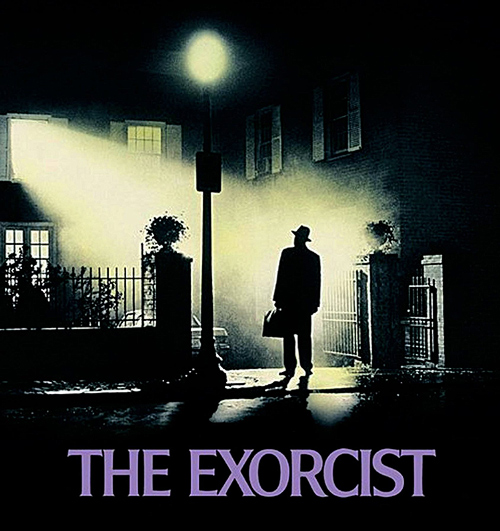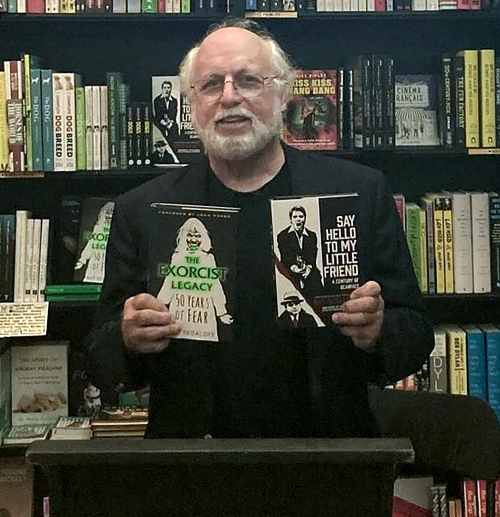In 2010 the Library of Congress selected The Exorcist for preservation in the National Film Registry as being “culturally, historically or aesthetically significant.” Its most recent home media release, on 4K UHD, was in September of this year.
For the occasion of the film’s anniversary this month, The Bits reached out to Nat Segaloff to discuss the legacy of The Exorcist.
Nat Segaloff is the author of over a dozen books, including The Exorcist Legacy: 50 Years of Fear (2023, Citadel). Segaloff has worked as a writer covering the film industry (for The Boston Herald), as a publicist (for Columbia, Twentieth Century-Fox and United Artists), and as a teacher (at Boston College and Boston University). Among his other film and television books are Say Hello to My Little Friend: A Century of Scarface (2023, Citadel), Breaking the Code: Otto Preminger vs. Hollywood’s Censors (2023, Applause), More Fire! The Building of The Towering Inferno (2023, BearManor), Shari Lewis & Lamb Chop: The Team That Changed Children’s Television (with Mallory Lewis; 2022, University Press of Kentucky), Big Bad John: The John Milius Interviews (2021, BearManor), Arthur Penn: American Director (2020, BearManor), A Lit Fuse: The Provocative Life of Harlan Ellison (2017, NESFA; second edition 2022, Sheridan), Stirling Silliphant: The Fingers of God (2013, BearManor), and Hurricane Billy: The Stormy Life and Films of William Friedkin (1990, William Morrow and Co). His novels include The Town That Said No (2022, BearManor) and Guarding Gable (2019, BearManor). His website is natsegaloff.com.
---
Michael Coate (The Digital Bits): What compelled you to write your recently published book on The Exorcist?
Nat Segaloff: Publishers currently have a fondness for books about movies having round anniversaries, and #50 for The Exorcist was commercially appealing. On a more personal note, I have been possessed (sorry) by The Exorcist for fifty years inasmuch as I was once a movie publicist in Boston when the film opened and had to weather the hype and hysteria surrounding it. I became William Friedkin’s biographer in 1990 with Hurricane Billy (Wm. Morrow) and have never ventured far from the film’s turbulent lore.
The Digital Bits: How do you think The Exorcist ought to be remembered on its 50th Anniversary?
 Segaloff: Like all great art, people take from The Exorcist what they bring to it. For some it is a spiritual affirmation. For others it is simply a scary movie. For a few, it remains too challenging to watch. I agree with William Peter Blatty that it is a supernatural detective story about the mystery of faith.
Segaloff: Like all great art, people take from The Exorcist what they bring to it. For some it is a spiritual affirmation. For others it is simply a scary movie. For a few, it remains too challenging to watch. I agree with William Peter Blatty that it is a supernatural detective story about the mystery of faith.
The Digital Bits: What was your impression of The Exorcist upon seeing it for the first time?
Segaloff: I had an unusual experience seeing The Exorcist—I didn’t see it, I heard it. My job was to stand guard at the theater where we were screening it for the press to shoo away anybody who wasn’t supposed to be there. Whenever I heard anything interesting inside, I would run into the auditorium to see what it was, but, by then, it was over. It took me a few days to finally catch the film because every showing was sold out, so I stood in the back of the house.
The Digital Bits: Any thoughts on Friedkin as the film’s director? The cast?
Segaloff: William Friedkin applied documentary techniques to the narrative needs of The Exorcist as well as a determination to make everything that happened in front of the camera actually take place there. Using mechanical means, rather than optical effects (no CGI in those days) and an extraordinarily complex magnetic soundtrack (Dolby was just coming into use, but not here), he created a veracity and verisimilitude that seduced audiences into believing in what they were seeing. Casting relative unknowns in the key parts also allowed audiences to relate to the characters rather than the actors.
The Digital Bits: What did you think of the film’s 1979 re-release (where it was remixed into Dolby Stereo and blown up to 70mm) and 2000 re-release (“The Version You’ve Never Seen”)?
Segaloff: I join other fans in regarding subsequent versions of The Exorcist as unnecessary with the exception of including the important “stairwell scene” between Merrin and Karras in which they discuss why the demon chose to possess Regan. The spider walk, the superimposed faces, and the Casablanca ending turned it into a standard horror film. The Dolby/70mm was supervised by Friedkin, but for me the original mono still holds sway inasmuch as you felt it was more real but you didn’t quite know why.
The Digital Bits: What is your opinion of the follow-up entries in what became a series?
Segaloff: The Exorcist III is a worthy follow-up that continues Blatty’s meditation on the meaning of faith. Both versions—The Exorcist III and the attempt at restoring Legion—are significant extensions of the themes of the original. The Heretic is like Fight Club in that the first rule of The Heretic is that you don’t talk about The Heretic. I address the prequels and TV series in my book, and I have not yet seen The Exorcist: Believer.
The Digital Bits: Which home media release of The Exorcist do you think is the best?
Segaloff: [As previously mentioned,] the original 1973 release remains the only The Exorcist I favor. There may be a tinge of nostalgia in my feelings, I admit.
The Digital Bits: How would you describe The Exorcist to someone who has never seen it or has expressed a dislike of scary films?
Segaloff: It’s hard to describe The Exorcist to someone who has never seen it or who has an antipathy toward scary movies. That’s what advertising departments are for. Just as I would never try to get a vegetarian to eat a hamburger, so I would not presume to beg, urge, or trick anybody into seeing The Exorcist. Hell, it took me thirty years to see The Sound of Music.
The Digital Bits: What do you think is the legacy of The Exorcist?
Segaloff: I just published a 330-page book trying to explain the legacy of The Exorcist. If I was able to do it in one sentence, I would have written a postcard. The fact that we’re still talking about it after half a century and The Sting, which beat it for the Best Picture Academy Award, is practically forgotten, says something, doesn’t it?
The Digital Bits: Thank you, Nat, for sharing your thoughts about The Exorcist on the occasion of its 50th anniversary.
--END--

-Michael Coate
Michael Coate can be reached via e-mail through this link. (You can also follow Michael on social media at these links: Twitter and Facebook)




